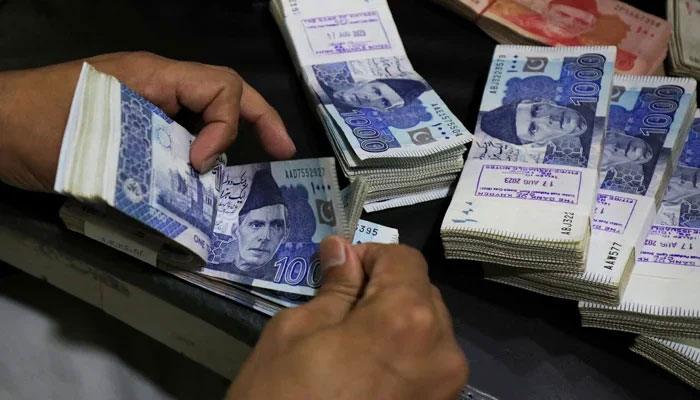Bank deposits increase by 17pc YoY to Rs31.1tr
KARACHI: Banking sector deposits reached Rs31.1 trillion in October, a 17.9 per cent increase over the same period last year, the State Bank of Pakistan data released on Monday showed.However, there was a minor 0.7 per cent month-on-month (MoM) decline in deposits in October.
In October, bank advances totalled Rs13.8 trillion, up 15.8 per cent year-on-year (YoY) and 12 per cent MoM. Moreover, investments fell 5.7 per cent MoM but increased 24.6 per cent YoY to Rs28.9 trillion.
The most recent figures for the banking industry came as banks are actively lending to private sector businesses and consumers in order to reach the 50 per cent advance-to-deposit ratio (ADR) benchmark and avoid paying more taxes. Second, as economic activity has gradually increased, the lowering of interest rates has prompted companies to take out loans.
The SBP cut its key interest rate by 250 basis points (bps) to 15 per cent at its fourth straight meeting this month. The SBP has reduced interest rates four times in a row since June, totalling 700bps.
If banks’ ADR drops below 50 per cent or 40 per cent by December 31, they will be subject to an additional tax at rates of 10 per cent and 16 per cent on profits from government securities.
The ADR for the banking sector rose to 44.3 per cent in October from 39.3 per cent in the previous month, as banks are accelerating their efforts to increase private sector loans and decrease deposits.
The investment-to-deposit ratio (IDR) increased to 93 per cent in October from 88 per cent a year earlier. In September 2024, the ADR stood at 97.9 per cent.Last week, the SBP removed minimum deposit rate (MDR) requirements from commercial banks for corporate and government deposits and applied MDR requirements on retail deposits for Islamic banks.
Due to this development, most banks have cancelled their circulars that impose fees on large deposits. Since all banks are now on a level with the minimum deposit rate standards, this change is somewhat detrimental to Islamic banks and advantageous to conventional banks.
Analysts say that the 12-month Market Treasury Bills (T-bills) were trading at about 11.7 per cent last week. That represents a significant discount to the current policy rate of 15 per cent.One of the main causes of the increasing demand for government paper is the ADR balancing factor. The stock and bond markets are being driven by the excess liquidity as banks strive to become ADR compliant. Markets are flooded with liquidity as a result of a T-Bill buyback and a modest but substantial fiscal surplus (from SBP profits and the petrol levy).
-
 Fresh Details Of King Charles, Queen Camilla's US Visit Emerge Amid Andrew Investigation
Fresh Details Of King Charles, Queen Camilla's US Visit Emerge Amid Andrew Investigation -
 Iran 'set To Buy' Chinese Carrier-killer Missiles As US Forces Gather In Region
Iran 'set To Buy' Chinese Carrier-killer Missiles As US Forces Gather In Region -
 Prince Harry And Meghan Unlikely To Meet Royals In Jordan
Prince Harry And Meghan Unlikely To Meet Royals In Jordan -
 Hero Fiennes Tiffin Shares Life-changing Advice He Received From Henry Cavill
Hero Fiennes Tiffin Shares Life-changing Advice He Received From Henry Cavill -
 Savannah Guthrie's Fans Receive Disappointing News
Savannah Guthrie's Fans Receive Disappointing News -
 Prince William Steps Out For First Solo Outing After Andrew's Arrest
Prince William Steps Out For First Solo Outing After Andrew's Arrest -
 Jake Paul Chooses Silence As Van Damme Once Again Challenges Him To Fight
Jake Paul Chooses Silence As Van Damme Once Again Challenges Him To Fight -
 Google Disrupts Chinese-linked Hacking Groups Behind Global Cyber Attacks
Google Disrupts Chinese-linked Hacking Groups Behind Global Cyber Attacks -
 Four People Killed In Stabbing Rampage At Washington Home
Four People Killed In Stabbing Rampage At Washington Home -
 Meghan Pushes Prince Harry Into Territory That’s Dangerous To His Brand: ‘She Isn’t Hearing A Word Of It’
Meghan Pushes Prince Harry Into Territory That’s Dangerous To His Brand: ‘She Isn’t Hearing A Word Of It’ -
 Christina Applegate Reflects On Lasting Impact Of Being Molested In Childhood
Christina Applegate Reflects On Lasting Impact Of Being Molested In Childhood -
 Martin Short Makes Big Decision Following Tragic Death Of Daughter
Martin Short Makes Big Decision Following Tragic Death Of Daughter -
 Antarctica’s Mysterious ‘gravity Hole’: What’s Behind The Evolution Of Earth’s Deep Interior?
Antarctica’s Mysterious ‘gravity Hole’: What’s Behind The Evolution Of Earth’s Deep Interior? -
 Hilary Duff Addresses Ashley Tisdale's 'toxic Mom Group' Claims And Matthew Koma's Firey Response
Hilary Duff Addresses Ashley Tisdale's 'toxic Mom Group' Claims And Matthew Koma's Firey Response -
 Jack Hughes's Proximity To Trump Angers Tate McRae Fans
Jack Hughes's Proximity To Trump Angers Tate McRae Fans -
 Neve Campbell Opens Up About Her 'difficult Decision' To Not Sign 'Scream 6'
Neve Campbell Opens Up About Her 'difficult Decision' To Not Sign 'Scream 6'




